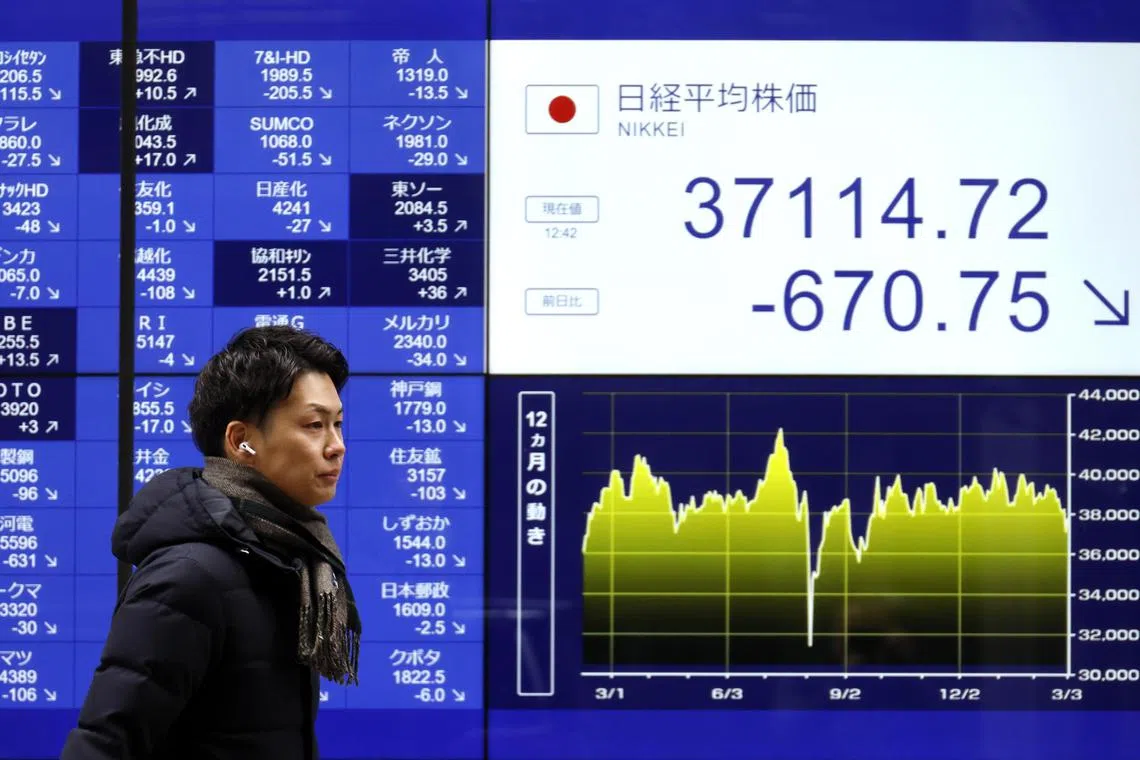As Trump tariffs arrive, companies brace themselves for more uncertainty
Sign up now: Get ST's newsletters delivered to your inbox

Key stock indexes across the globe are taking a hit following new US tariffs trigger on Canada, Mexico and China.
PHOTO: EPA-EFE
WASHINGTON – Business executives have been in a state of limbo over President Donald Trump’s fluctuating plans to impose major tariffs since he took office in January. The announcement on March 4 does not end that uncertainty.
Mr Trump announced he would impose 25 per cent tariffs
The prospect of major levies on foreign imports has dominated corporate America’s discussions in 2025.
Since the beginning of 2025, more than 750 of the largest US companies have discussed the topic either at investor events or on earnings conference calls, according to LSEG data.
In recent weeks, some companies raced to get ahead of tariffs with pre-ordering of goods, but executives have until now been taking a wait-and-see approach on investments and expenditures, as Mr Trump has altered his plans for tariffs several times since retaking office.
While the announcement on March 4 adds some clarity, it is not the end of the story.
Mr Trump has already promised additional tariffs on the European Union and investigations into copper and lumber imports that result in levies on those goods.
In addition, other nations have vowed retaliation after trying to negotiate with Mr Trump that could threaten global trade further.
“The uncertainty continues,” said Mr David Young, an executive with the Conference Board, a global business group. “There are decisions being postponed and delayed… There very much is a degree of paralysis.”
Executives have tried to assuage investors that they will be able to mitigate or pass on the additional costs, but some have also expressed their frustration with the White House’s numerous shifts on policy.
“As regard tariffs, I think your guess is as good as mine. Things keep on changing day by day,” Mr Hilton Schlosberg, co-CEO of Monster Beverage, told analysts on a company earnings call on Feb 27.
Undermining confidence
The uncertainty has undermined business and consumer confidence in recent weeks, after initially improving after Mr Trump’s re-election.
The ISM Manufacturing Index, a major index of manufacturer sentiment, showed a sharp spike in inflation expectations in February, with suppliers citing tariffs numerous times.
US consumer confidence fell to an eight-month low
“It’s uncertainty that’s kind of fuelling customer angst,” Autodesk CEO Andrew Anagnost told investors. “That’s the thing that we want to move past. We want to move to certainty (in) policy… Uncertainty is not something that our customers want to work through.”
In Mr Trump’s first term, he concentrated on combating what his administration viewed as predatory behaviour by China in the world trade market.
He has already imposed a 10 per cent tariff on Chinese goods, with an additional 10 per cent set for March 4, and is threatening port entry fees on Chinese-built ships.
But he has also taken aim at Canada and Mexico to address his charges that they have not tried to deal with cross-border fentanyl smuggling or migrant immigration.
The US imports US$900 billion (S$1.2 trillion) of goods a year from Canada and Mexico. The three countries have highly integrated supply chains in the automotive industry, where parts can cross borders several times in the manufacturing process, and substantial cross-border trade in industrial goods, aerospace, agriculture and energy.
Mr Trump’s advisers and supporters have said their goal is to bring more manufacturing to the US to reduce the country’s record trade deficit.
“While (they are) inflationary and might hurt in the short term, tariffs are going to be good for American jobs in the long run,” said Mr Justus Parmar, CEO of Fortuna Investments.
Some companies have said they could shift some manufacturing to the US, including Honda and Pfizer, but that could add to costs.
Others pre-ordered in January in advance of heavy tariffs, but suppliers interviewed by Reuters say that is a short-term strategy at best, as they would prefer not to hold extra inventories due to uncertainty around demand.
“It’s a tremendous waste of resources,” said Mr Pat D’Eramo, chief executive of Canadian auto supplier Martinrea. “I’d much rather be working on ways to reduce my costs so we can be more competitive.” REUTERS


